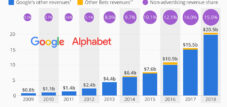Google's empire is shaky: Google spin-off strategies – What do the antitrust proceedings mean for the advertising business?
Xpert pre-release
Language selection 📢
Published on: September 2, 2025 / Updated on: September 2, 2025 – Author: Konrad Wolfenstein

Google's empire is shaky: Google spin-off strategies – What do the antitrust proceedings mean for the advertising business? – Image: Xpert.Digital
The Google Earthquake: How the Antitrust Proceedings Are Changing Online Advertising Forever
### Secret plan revealed: How Google is preparing internally for its own breakup ### More than just a fine: Why the US government really wants to break up Google ### A dam break for the tech world? What the rulings against Google mean for all of us ###
Is Google's advertising monopoly over? These alternatives are already available
Google, the undisputed giant of the digital world, is at a crossroads. Following two historic rulings in the US that classify the company as an illegal monopolist in the areas of internet search and advertising technology, a turning point looms that could shake the company's foundations: breakup. The US government is demanding drastic measures to break Google's market power and restore competition.
At the center of the turmoil is Google's core business – the multi-billion dollar advertising business, which accounts for approximately 75 percent of parent company Alphabet's total revenue. Specifically, the US Department of Justice's demands target the spin-off of key business units, including the Chrome browser and, above all, the entire Google Ad Manager division, which emerged from strategic acquisitions such as DoubleClick and now dominates the online advertising market.
While Google officially announces an appeal, arguing that a spin-off is technically impractical, internal processes indicate that Mountain View is already preparing for the unthinkable. Plans to spin off the controversial advertising division are apparently already being finalized. This development could not only change Google itself, but also reshape the entire digital advertising landscape. Advertisers, publishers, and competitors now face the crucial question: What does a future look like in which the advertising ecosystem is no longer solely controlled by Google, and what alternatives are available to fill the resulting gap?
Is the advertising business now at risk of being broken up? What is the current status of the antitrust proceedings against Google?
Google is currently facing several crucial antitrust battles in the US that could fundamentally change the company's business model. In the past two years, Google has been classified as an illegal monopolist in two separate cases. One concerns its dominance in internet search and the other its market dominance in online advertising technology.
The first trial concerned internet search and ended with a guilty verdict in August 2024. A judge found that Google had established an illegal monopoly in internet search and related advertising and defended it with billions of dollars in payments. The company allegedly paid $26 billion to electronics device manufacturers to establish its own search engine as the default option.
What role does the advertising business play in antitrust proceedings?
The advertising business is at the center of the legal disputes because it is Google's most important source of revenue. Parent company Alphabet generates approximately 75 percent of its revenue from advertising. Of Alphabet's $350 billion in annual revenue in 2024, approximately three-quarters came from advertising revenue.
In April 2025, Google was convicted in a second antitrust case, this time for its market dominance in advertising technologies. Judge Leonie Brinkema concluded that the company had achieved a monopoly position in ad server and ad exchange platforms through unfair competition over more than ten years. The US Department of Justice accuses Google of using classic monopoly methods by eliminating competitors through acquisitions and controlling how transactions are conducted in the online advertising market.
What is Google Ad Manager and why is it in focus?
Google Ad Manager is the company's central advertising platform, combining various services for managing and delivering online advertising. The platform was created through the integration of various acquisitions, most notably the multi-billion dollar acquisition of DoubleClick in 2007.
In the DoubleClick acquisition, Google paid $3.1 billion in cash for the internet advertising company. At the time, this acquisition was the largest in Google's history and cost nearly twice as much as the video portal YouTube. DoubleClick brought with it key technologies such as Ad Exchange (ADX) and DoubleClick for Publishers (DFP), which were later integrated into Google Ad Manager.
In addition to the DoubleClick acquisition, Google also acquired Admeld, a yield optimizer in the auction-based media trading space, for approximately $400 million in 2011. This acquisition further strengthened Google's position in the real-time bidding market.
What concrete measures are being demanded against Google?
The US government is demanding drastic measures to restore competition. In its search engine proceedings, the Department of Justice is demanding the spin-off of the Chrome browser and an end to the multi-billion dollar deals that have established Google as the default search engine. Furthermore, Google is being required to share search results and information with competitors for ten years.
In the advertising technology case, the US government is specifically demanding the spin-off of the Ad Manager division, which includes the ad server and ad exchange divisions affected by the rulings. Prosecutors argue that Google, through its control over several aspects of the advertising trade, has established a monopolistic position that can only be ended by breaking it up.
How is Google preparing for a possible spin-off?
Google is reportedly already working on making its Ad Manager division viable as an independent company. These internal preparations have already become apparent externally. Last month, advertisers were irritated when Google employees from the Ad Manager division questioned them about how to work together. This put the division in direct competition with another Google division, which is actually responsible for selling advertising to agencies.
Such internal competition only makes sense if the company is preparing to outsource the controversial department. These plans have been discussed internally within Google for years, as the department has been the focus of continuous criticism from competition authorities, and a conviction recently seemed only a matter of time.
What economic impact would a spin-off have?
A spin-off of the Ad Manager Group would have a relatively small impact on Google's financial situation. Advertising sales on third-party websites now account for only 8.7 percent of Alphabet's revenue, and the Ad Manager Group generates only a portion of that. By comparison, advertising sold through Alphabet's own services, primarily through its search engine, currently accounts for 57 percent of its revenue.
According to research by Wedbush and an analysis of court documents, Ad Manager accounted for 4.1 percent of total revenue and 1.5 percent of operating profit in 2020. A sale of the Ad Manager group could therefore be relatively easy for the company, especially since it would also eliminate a long-standing point of conflict with regulators.
How would an independent ad management department position itself in the market?
As an independent company, Google's Ad Manager division would still be significantly larger than direct advertising technology competitors such as PubMatic or Magnite. These two companies are among the most important alternatives to Google's advertising platforms and offer supply-side platform solutions for publishers.
PubMatic enables premium publishers to unlock the full potential of their digital assets, offering modern user interfaces with comprehensive data integration. Magnite, formed from the merger of Rubicon Project and Telaria, is particularly attractive to smaller publishers as it has no setup fees. Both companies operate on a revenue-sharing model and support various advertising formats, including display, video, and connected TV advertising.
With the goal of independence, Google's Ad Manager division could also more aggressively penetrate new markets. While it remains dominant in traditional online advertising on websites, it plays only a minor role in streaming TV advertising, with the exception of YouTube. Google has also recently fallen significantly behind in the sale of advertising in games.
Our recommendation: 🌍 Limitless reach 🔗 Networked 🌐 Multilingual 💪 Strong sales: 💡 Authentic with strategy 🚀 Innovation meets 🧠 Intuition
At a time when a company's digital presence determines its success, the challenge is how to make this presence authentic, individual and far-reaching. Xpert.Digital offers an innovative solution that positions itself as an intersection between an industry hub, a blog and a brand ambassador. It combines the advantages of communication and sales channels in a single platform and enables publication in 18 different languages. The cooperation with partner portals and the possibility of publishing articles on Google News and a press distribution list with around 8,000 journalists and readers maximize the reach and visibility of the content. This represents an essential factor in external sales & marketing (SMarketing).
More about it here:
Google in the TV and advertising market: Regulation, ad-tech disputes, and market shifts
What are the challenges with connected TV and streaming?
Google faces particular challenges with connected TV. Streaming TV platforms like Uber and Roku criticize Google's tools for being designed more for small web publishers than for enterprise companies. Publishers also argue that they earn less from Google than from competitors because demand is weaker and innovations are implemented slowly.
At the same time, Google is expanding its position in the TV sector. With the Google TV Network, the company has created a platform for advertisers to place personalized ads on FAST channels. The network enables non-skippable spots on more than 125 linear channels and reaches more than 20 million monthly active users in the US via Google TV.
Competitors like Roku are also pursuing aggressive advertising strategies. Roku already displays ads on the home screen and is even experimenting with commercials that play before reaching the home screen. The company has even filed a patent for inserting ads into HDMI inputs, allowing ads to be displayed on external devices such as game consoles.
How is the European Union reacting to Google’s market power?
The European Union is pursuing a different approach than the US. According to reports, the EU is close to concluding a four-year investigation into Google's advertising business with comparatively lenient penalties. An order to sell parts of the advertising business is no longer under discussion, nor are billions of euros in fines.
In the past, the EU Commission caused a stir with its heavy fines against Google, but found that these measures did little to change the company's dominance. Recently, the EU has increasingly relied on new laws such as the Digital Markets Act and the Digital Services Act, which generally impose stricter rules on large tech companies.
What does the Digital Markets Act do in Europe?
The Digital Markets Act, which came into full force in March 2024, aims to regulate so-called gatekeepers ex ante and subject them to stricter regulations. These are large online platforms with dominant market positions that control access to key markets. Currently, seven platforms are classified as gatekeepers, including Google.
On April 23, 2025, the European Commission imposed its first DMA sanctions against Apple (€500 million) and Meta (€200 million) for various violations. Violations of the DMA regulations could result in heavy fines of up to ten percent of the company's global annual turnover.
Is the Digital Markets Act under pressure?
The EU Commission is reportedly currently reviewing all its investigations under the Digital Markets Act. According to the Financial Times, the Commission has reviewed all investigations it has opened so far under the DMA. During this period, no decisions on possible fines will be made, although actual work on the investigations continues.
This development may be related to political pressure from the United States. The US government under the new presidency is stepping up its stance with tariff threats that also aim to override the regulations, which are sanctioned with heavy fines. US tech companies such as Apple, Meta, and Google are urging the new US president to intervene against what they consider overzealous EU regulation.
What impact will the proceedings have on Google's share price?
The antitrust disputes are already significantly impacting Google's share price. Following the court's ruling in the advertising technology case, shares of Google, a subsidiary of the US corporation Alphabet, temporarily fell by as much as 2.1 percent. Uncertainty about the potential consequences of the proceedings is leading to continued volatility in the stock market.
The advertising business remains central to Google. Google again generated over $200 billion from advertising in 2024. The tech giant's search engine is the global market leader in the search engine market, with a market share of over 90 percent. This dominant position allows Google to raise its prices for advertisers without facing negative consequences.
How is the global advertising market developing?
Google and Meta dominate the global digital advertising market with a combined market share of nearly 50 percent. Google holds a 27.4 percent market share of the global digital advertising market, while Meta ranks second with 21.9 percent. Amazon, in turn, holds a market share of 8.5 percent.
The largest share of Google's revenue comes from search engine search. In search advertising, Google remains the dominant player with projected revenue of over $157 billion in 2024, accounting for a 55.6 percent market share. In display advertising, Google's global business is expected to grow to $31.85 billion.
What technical challenges are there in a spin-off?
Google argues that a forced spinoff of its advertising technology division is technically impractical. The company claims that the code won't work outside of Google and that a complete rewrite would be necessary. This argument is part of Google's defense strategy against the court-ordered measures.
Instead, Google is offering to address the competition concerns with changes to the way the platforms operate and increased investment in their infrastructure. For example, Google could open up the real-time auctions on its own platform to third parties and give customers more control over the marketing of their advertising space. Whether such concessions are sufficient to avoid a breakup remains questionable.
What does the future of Google's advertising business look like?
The future of Google's advertising business will depend significantly on the outcome of the ongoing legal proceedings. A follow-up hearing on the specific remedies in the search engine case is scheduled to begin in April 2025. Decisions on the measures in the advertising technology case are expected starting in September.
Google has already announced that it will appeal all rulings. The company will undoubtedly exhaust all available legal remedies to avoid a breakup. At the same time, Google is working on new technologies and business models that are less vulnerable to antitrust criticism.
The development of artificial intelligence and automated advertising systems will continue to transform the business. With Performance Max and other AI-powered campaign formats, Google is increasingly relying on automation and machine learning. While these technologies reduce operational complexity, they increase the strategic demands on data quality and creative strategy.
What alternatives are there for advertisers and publishers?
The advertising technology market already offers various alternatives to Google's platforms. Publishers can rely on supply-side platforms such as PubMatic, Magnite, or OpenX. These providers enable publishers to market their inventory through various demand partners and thereby achieve higher returns.
PubMatic offers a modern user interface with comprehensive data integration and advanced targeting options via the Connect platform. Magnite, formed from the merger of Rubicon Project and Telaria, is particularly attractive to smaller publishers and offers excellent customer support with no setup fees. OpenX focuses on video monetization and real-time bidding with detailed audience segmentation.
The fragmentation of the advertising market could be further exacerbated by a potential spin-off of Google's Ad Manager division. Publishers and advertisers would benefit from increased competition and innovation, but would also have to manage more complex technology stacks. The industry is already preparing for these changes and developing new standards and technologies for a more decentralized advertising landscape.
The outcome of the antitrust proceedings will have a lasting impact not only on Google's business model, but on the entire digital advertising industry. Regardless of the specific outcome, it is clear that the balance of power in the online advertising market will fundamentally change in the coming years.
Your global marketing and business development partner
☑️ Our business language is English or German
☑️ NEW: Correspondence in your national language!
I would be happy to serve you and my team as a personal advisor.
You can contact me by filling out the contact form or simply call me on +49 89 89 674 804 (Munich) . My email address is: wolfenstein ∂ xpert.digital
I'm looking forward to our joint project.

























